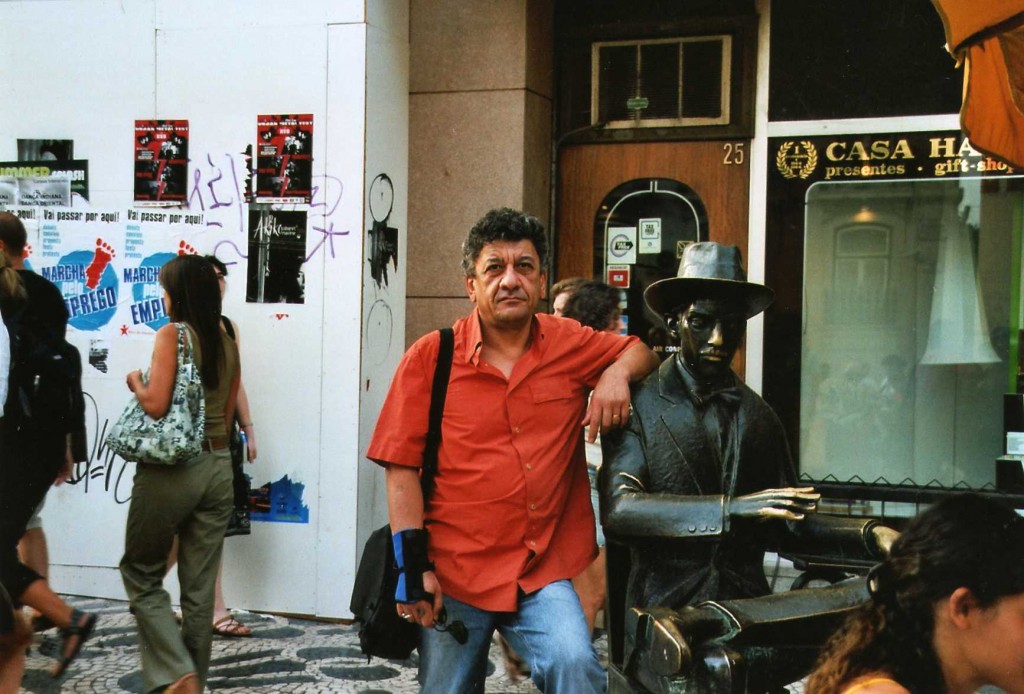
Officially Najem Wali was – as millions of Iraqis – born on Juli 1st in 1956. But the truth is that he was born on October 20th 1956 in the South of Iraq. This is just one of many stories in the country of thousand and one dictatorship und thousand and more wars. Having finished his A-Levels in Basra and Amara (his official places of birth, by the way) he began his studies of German Literature at the University of Bagdad. Having passed his university degrees in 1978 he was drafted for military service. In 1980 and during the military service he was arrested and tortured as a “dissenter” and “opponent of war”. A miracle made him come clear and he continued the military service up to his discharge in August 1980.
Not long after the Iraq-Iran War started on September 22nd in 1980 young men in his age were drafted again. He didn’t want to go to war, so he decided to leave the country. It wasn’t easy to get an exit visa, not least because his name was on the list of people who were not allowed to leave the country. But with the help of bribe and some friends he was able leave Iraq half legally half illegally. He came to the Federal Republic of Germany on November 8th in 1980 where he continued his studies of German Language and Literature and obtained the degree of Magister Artium. His thesis dealt with Jakob Michael Reinhold Maria Lenz’s Der Hofmeister und die Soldaten und die neuen Interpretationen bei Bertold Brecht und Heiner Kipphardt.
In 1987 Najem Wali went to Madrid to study Spanish Literature. In 1990 he returned to Hamburg. Several study visits followed, as for example to Oxford in 1993 and to Florence in 1995.
Najem Wali started writing early. He wrote his first story in the age of 16 and began to work as a journalist for Radio Bagdad and a weekly magazine when he was still a student.
His novel The Journey to Tell al-Lahm was published by Carl Hanser publishing in 2004 and by DTV in 2010. Having become a bestseller and been reprinted several times– especially in the Gulf States, Saudi Arabia, Iraq and Egypt – the book soon advanced to a cult novel.
In behalf of the IOM (International Organisation for Migration) Najem Wali helped to organize the first Iraqi elections (January and February 2005) from his German exile. In 2002 he accompanied Günter Grass on his journey to Jemen and took part in lots of international meetings and conferences, for the last time at the University of Haifa in March 2007 in a meeting themed “Quo Vadis Iraq?”.
Today Najem Wali mainly lives in Berlin and works as a freelance author, journalist and culture correspondent of the most important Arabic daily newspaper Al Hayat, as well as Al Mada and the Tattoo Magazin which are based in Bagdad. His books have been translated into several languages. Najem Wali also writes for well known German newspapers on a regular basis, t.i. Süddeutsche Zeitung, Neue Zürcher Zeitung, and Die Zeit, amongst others.
Najem Wali has won numerous awards. The latest was the Bruno Kreisky Award for the Political Book 2014.
His Works
– War in the nigthclubdisctrict, Sahara edititon, Damaskus 1993.
– The last night of Marie, narratives, Dar Sharquiat, Cairo 1995.
– A place called Kumait, novel, Dar Sharquiat, Cairo 1997
– Waltzing Matilda, narratives, Dar Al Meda, Damaskus 1999.
– Tel Al Laham, novel, Dar Alsaqi, LondonBeirut 2001. (New edition: Merit, Cairo 2005)
– Jussif´s Picture, novel, Al Markaz, Beirut Casablanca, 2005. (New edition: Merit, Cairo 2008)
– The South Angel, novel, Kaleembooks,Dubai 2009. (New edition: Dar Al Mada, Damaskus, Beirut und Bagdad 2010)
– Bagdad Marlboro, a Novel for Bradley Manning, arabic Institut for Stydies and Publication, Amman, Beirut 2012
– The Balkan Route. Curse and Blessing of Centuries. Matthes & Seitz Berlin, 2017
– Sara´s Sin, novel, Daralrafidain Beirut, Baghdad 2018
